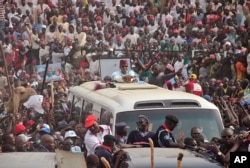Attacks on opposition supporters in Nigeria’s Niger Delta region are raising fears of greater violence in the region should President Goodluck Jonathan lose his re-election bid February 14.
Over the past month, supporters of the opposition All Progressives Congress have been shot at and had their offices bombed in Nigeria’s southern Niger Delta region.
Voters in this region are expected to overwhelmingly cast ballots for President Goodluck Jonathan, who is from Bayelsa - one of the states that make up the oil-producing region.
The APC is fielding former military ruler Muhammadu Buhari against Jonathan, in what is expected to be Nigeria’s most competitive election since the return of democracy in 1999.
The presidential poll will be followed by state elections on February 28. Many fear that opposition victories in either vote could spark a backlash of violence against individuals and ethnic groups in the Niger Delta seen as supportive of the APC.
Isitoah Ozoemene, a political activist and lecturer at the Delta State College of Education in Warri, blames inflammatory campaign rhetoric for the violence in the region.
“People are vying for political office. They should be in a position to sit down and educate the public on the blueprint they have to change their lives. In our times here, that is not what people do. People go on a slog campaign. People go on character assassination. People start digging up things to unearth. And people want to intimidate others. And these are the things that result in violence," said Ozoemene.
Retaliation
Some of the violence in the Delta is seen as retaliatory for events that happen elsewhere in Nigeria.
On January 10, hooligans smashed a campaign bus and other property belonging to the president’s Peoples Democratic Party in the north-central city of Jos. That same day, APC members were attacked in Rivers State during a party meeting. The day after that, an APC office in Rivers State was bombed.
Dillion Oyuwe is an assistant to the APC state chairman in Delta State. He says political violence will affect all parties in the country, not just the APC.
“The only language they know, they understand, is destruction. And destruction does not single out any political party per se. In that sense, I say, it does not affect only APC. It will equally affect all political parties," said Oyuwe.
Other issues also heighten the potential for violence. The Delta has long been a hotbed for militancy, with organized bands attacking pipelines and kidnapping foreign oil workers until an amnesty was negotiated in 2009.
With most of the former militants seen as backing the sitting government, Ozoemene fears they could take the lead any post-election violence should Buhari win. Further complicating manners is the defection of Rivers State Governor Rotimi Amaechi to the APC in 2013, which heightened political infighting in that state.
Kingsley Kuku is an adviser to Jonathan on Delta affairs. He blames the violence on thuggery and infighting within the APC, but added that tension around election time is inevitable.
“I don’t expect any resurgence of any violence in the Niger Delta now. In any case, in this political era, everybody is busy with the movement towards the election, 14 February and 28 February. Beyond that, certain activities are bound to happen all over the country. The election and the results are bound to make some reactions, to elicit some reactions," said Kuku.
Buhari, meanwhile, is expected to get most of his political support from Nigeria’s north and southwest.
